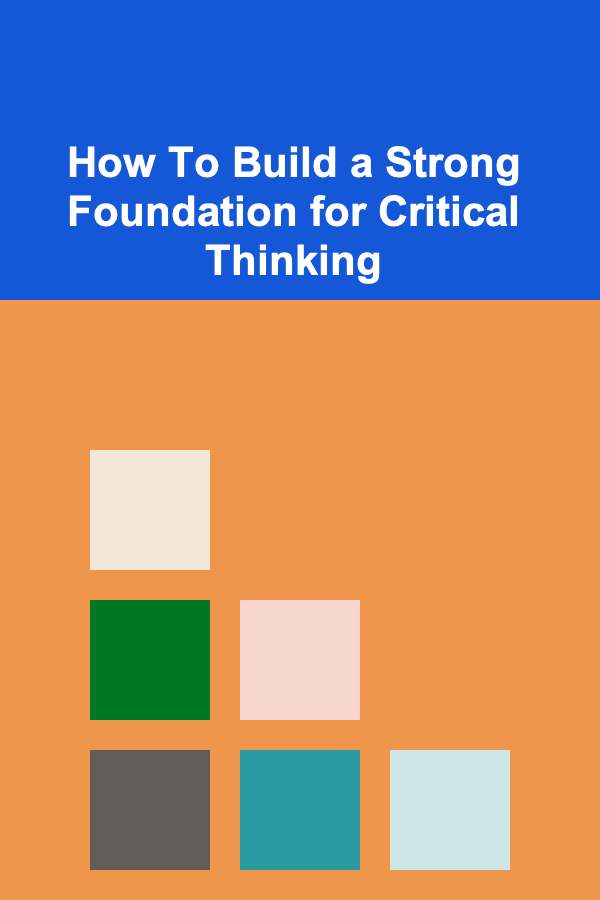
How To Build a Strong Foundation for Critical Thinking
ebook include PDF & Audio bundle (Micro Guide)
$12.99$11.99
Limited Time Offer! Order within the next:

Critical thinking is an essential skill for personal and professional success in today's fast-paced and information-saturated world. It allows individuals to analyze situations, solve complex problems, and make informed decisions. The ability to think critically is not something innate; it is a skill that can be developed and strengthened through conscious effort and practice. Building a strong foundation for critical thinking involves understanding its key components, developing mental habits that foster it, and practicing techniques that encourage objective reasoning and effective decision-making.
This article will explore the process of building a strong foundation for critical thinking, discussing its importance, key skills, strategies to improve it, and how it can be nurtured in both personal and professional contexts.
The Importance of Critical Thinking
Critical thinking is at the core of effective problem-solving. In our everyday lives, we face complex decisions, whether personal or professional. In many cases, the ability to think critically can mean the difference between success and failure. A critical thinker is someone who does not take things at face value but instead questions assumptions, seeks evidence, and weighs alternatives before making conclusions or decisions.
In the modern world, where misinformation and oversimplification are prevalent, critical thinking serves as a safeguard against biases and fallacies. It helps us navigate complex issues, filter through overwhelming amounts of information, and arrive at sound conclusions. It is not just about being analytical; it is about having a mindset that prioritizes accuracy, clarity, and logic.
Key Components of Critical Thinking
Critical thinking encompasses several key components that must be developed in tandem to form a strong foundation. These include:
1. Clarity
Critical thinking begins with clarity, which means the ability to express thoughts, ideas, and arguments in a clear and understandable way. To think critically, you must first be able to articulate the problem or question you are addressing. Without clarity, it's impossible to analyze or solve anything effectively.
2. Accuracy
Accuracy refers to how closely an argument or assertion aligns with the facts or reality. Critical thinkers are precise and careful in their reasoning, seeking to ensure that the information they are using is correct and relevant. This includes recognizing when information is incomplete or misleading.
3. Precision
Precision involves going into the necessary detail in your arguments or decisions. Critical thinkers do not oversimplify problems; they take care to consider nuances, alternative explanations, and possibilities that might be relevant to the issue at hand.
4. Relevance
Relevance is the ability to stay focused on the key issues at hand and avoid getting sidetracked by irrelevant details or emotional reactions. Critical thinkers are selective about the information they pay attention to, ensuring that only relevant facts are included in their decision-making process.
5. Logical Consistency
Logical consistency is crucial in critical thinking because it involves drawing conclusions based on logical and structured reasoning. A critical thinker makes sure that their arguments follow a coherent pattern and that their conclusions are well-supported by evidence.
6. Fairness
Fairness is the commitment to approaching problems and issues impartially, without bias or prejudice. Critical thinkers consider multiple perspectives and treat all arguments with equal respect, ensuring that their judgments are based on reason rather than emotion or personal preference.
7. Depth
Critical thinking requires depth, meaning that one must engage with complex issues in a thorough and detailed manner. This is the opposite of oversimplifying problems and rushing to conclusions. Depth encourages exploring the root causes of problems, understanding the complexities of issues, and considering long-term implications.
8. Breadth
Breadth is about considering a wide range of perspectives and alternatives when thinking critically. It involves stepping outside of one's own biases and considering viewpoints that may differ from one's own. A broad perspective allows for more comprehensive analysis and decision-making.
9. Significance
In critical thinking, significance refers to focusing on the most important aspects of a situation or problem. Critical thinkers prioritize the issues that have the greatest impact, ignoring trivial details that could distract from meaningful analysis.
10. Self-regulation
Self-regulation refers to the ability to monitor and adjust your own thinking. It involves questioning one's own assumptions and being open to changing one's perspective when new evidence is presented. This quality is crucial for long-term growth as a critical thinker, as it enables you to evolve your thought processes and refine your decision-making.
Developing Mental Habits for Critical Thinking
Building a strong foundation for critical thinking involves cultivating mental habits that promote intellectual growth, objectivity, and analytical skills. These habits help you think with clarity, precision, and fairness. Here are some essential mental habits to develop for critical thinking:
1. Question Assumptions
One of the most fundamental habits of a critical thinker is the ability to question assumptions. We all make assumptions based on our personal experiences, beliefs, and biases. While assumptions can be useful for making quick decisions, they can also cloud our judgment. To think critically, we must regularly ask ourselves whether the assumptions we hold are valid, whether they are supported by evidence, and whether there are alternative viewpoints we have not considered.
2. Practice Active Listening
Critical thinking involves actively engaging with information. Active listening is a key practice that helps develop this engagement. Instead of simply hearing what others are saying, active listening requires full attention, questioning, and reflecting on what is being said. This approach helps us understand the core of arguments and enables us to respond thoughtfully.
3. Embrace Intellectual Curiosity
Intellectual curiosity is the desire to learn, explore, and discover new ideas. It fuels the process of inquiry and encourages critical thinkers to ask more questions, challenge their own knowledge, and explore different perspectives. Being curious opens up new avenues for learning and growth, which is essential for effective critical thinking.
4. Consider Multiple Perspectives
Critical thinking involves considering different perspectives, especially those that challenge your own. By exploring multiple viewpoints, you broaden your understanding of an issue and become more open-minded. This habit prevents tunnel vision and allows you to arrive at more well-rounded, balanced conclusions.
5. Practice Reflection
Reflection is the process of reviewing your thoughts, decisions, and actions to assess their validity and effectiveness. Critical thinkers regularly reflect on their thinking processes, recognizing areas where they may have made assumptions, overlooked evidence, or been influenced by bias. This habit allows you to refine your thinking and make more informed decisions in the future.
6. Challenge Your Own Beliefs
Critical thinkers are not afraid to challenge their own beliefs and assumptions. This means being open to the possibility that what you know or believe may be incorrect. By regularly testing your beliefs, you can identify weak spots in your reasoning and improve your understanding of complex issues.
7. Be Open to Feedback
Feedback from others can be an invaluable tool for critical thinking. Engaging in thoughtful discussions with others, seeking feedback, and considering alternative viewpoints can help you refine your thinking and avoid errors in judgment. Being open to constructive criticism is essential for growth as a critical thinker.
8. Stay Calm Under Pressure
In high-stress situations, it's easy to make rushed decisions without properly analyzing the issue. Critical thinking requires the ability to stay calm, collect your thoughts, and analyze the situation carefully before acting. This habit is particularly important in decision-making, as it helps prevent emotional reactions from clouding your judgment.
Techniques for Improving Critical Thinking
Once you have developed the mental habits that foster critical thinking, there are several techniques and exercises you can practice to sharpen your skills. These techniques can help you approach problems systematically and think more logically.
1. Mind Mapping
Mind mapping is a visual tool that helps organize thoughts, ideas, and arguments. It allows you to see connections between different concepts and evaluate the relationships between them. By visually mapping out the problem, you can identify gaps in your reasoning, make connections you may have missed, and find new solutions.
2. The Socratic Method
The Socratic method is a form of cooperative argumentative dialogue that encourages critical thinking through questioning. By asking a series of probing questions, you can guide yourself or others toward deeper understanding. This method helps clarify concepts, expose contradictions, and uncover assumptions that may be limiting your thinking.
3. The Six Thinking Hats
The Six Thinking Hats technique, developed by Edward de Bono, is a structured method for considering an issue from different perspectives. Each "hat" represents a different mode of thinking: white (facts), red (emotions), black (judgment), yellow (positivity), green (creativity), and blue (process). By switching between these perspectives, you can explore an issue from multiple angles and make more balanced decisions.
4. Cost-Benefit Analysis
A cost-benefit analysis involves evaluating the potential outcomes of different decisions by weighing the costs against the benefits. This technique forces you to think critically about the consequences of your actions and make decisions that are both logical and beneficial.
5. The "Five Whys"
The "Five Whys" is a technique used to explore the root cause of a problem by asking "why" repeatedly. By delving deeper into the reasons behind a problem, you can uncover underlying causes and gain a more thorough understanding of the situation. This technique helps prevent surface-level thinking and encourages deeper analysis.
Applying Critical Thinking in Different Contexts
Building a strong foundation for critical thinking involves applying it to various aspects of life. Whether in education, work, or personal relationships, critical thinking is essential for effective decision-making.
1. In Education
Critical thinking is a vital skill for students and learners of all ages. It enables individuals to engage with complex concepts, analyze information critically, and develop original ideas. By cultivating critical thinking skills, students can improve their ability to problem-solve, participate in discussions, and succeed academically.
2. In the Workplace
In the workplace, critical thinking is essential for making informed decisions, solving problems, and driving innovation. Whether it's evaluating data, assessing risks, or developing strategies, critical thinking allows employees to approach challenges in a systematic and logical way. Professionals who think critically are better equipped to adapt to changing circumstances and make decisions that align with organizational goals.
3. In Personal Life
Critical thinking is also valuable in personal decision-making. Whether deciding how to manage finances, solve conflicts, or make life choices, critical thinking helps individuals approach situations with a clear and rational mindset. It encourages self-reflection and helps prevent emotional or impulsive decisions.
Conclusion
Building a strong foundation for critical thinking is a process that requires practice, reflection, and continuous learning. By developing the key components of critical thinking, cultivating mental habits that support it, and applying specific techniques, individuals can enhance their ability to analyze information, make better decisions, and solve problems effectively. Whether in education, the workplace, or personal life, critical thinking is a skill that leads to greater success, more informed choices, and a deeper understanding of the world around us. With dedication and effort, anyone can develop and refine this essential skill to achieve their goals and make meaningful contributions to society.

How to Build an Investment Portfolio with Limited Funds
Read More
How to Plan a Smooth and Organized Home Party Timeline
Read More
How to Plan Your Dream Vacation with Discounted Travel Deals
Read More
How to Soundproof Your Home During a Renovation
Read More
How To Print with Multiple Extruders
Read More
How to Teach a Child to Solve the Rubik's Cube
Read MoreOther Products

How to Build an Investment Portfolio with Limited Funds
Read More
How to Plan a Smooth and Organized Home Party Timeline
Read More
How to Plan Your Dream Vacation with Discounted Travel Deals
Read More
How to Soundproof Your Home During a Renovation
Read More
How To Print with Multiple Extruders
Read More